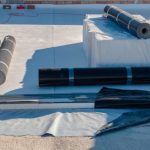The Role of Insulation in Industrial Roofing
March 8, 2024 8:32 pm Leave your thoughts Insulation plays a crucial role in industrial roofing systems, providing a range of benefits that contribute to the overall performance and efficiency of the building. In this blog, we will explore the importance of insulation in industrial roofing, how it works, and the different types of insulation materials commonly used.
Insulation plays a crucial role in industrial roofing systems, providing a range of benefits that contribute to the overall performance and efficiency of the building. In this blog, we will explore the importance of insulation in industrial roofing, how it works, and the different types of insulation materials commonly used.
The Benefits of Insulation in Industrial Roofing
Insulation in industrial roofing serves multiple purposes, including thermal resistance, moisture control, noise reduction, and energy efficiency. By effectively insulating a commercial or industrial building, property owners can create a comfortable and stable indoor environment, protect the roof structure from damage, and reduce energy costs associated with heating and cooling.
Thermal Resistance: One of the primary functions of insulation in industrial roofing is to provide thermal resistance, preventing heat loss in the winter and heat gain in the summer. Properly insulated roofs help regulate indoor temperatures, reducing the need for excessive heating or cooling and improving overall comfort for occupants.
Moisture Control: Insulation also plays a crucial role in preventing moisture buildup in the roof system. By creating a barrier against water vapor, condensation, and leaks, insulation helps protect the structural integrity of the roof and reduces the risk of mold and mildew growth.
Noise Reduction: Industrial buildings often have high noise levels due to machinery, equipment, or external sources. Insulation can help absorb and dampen sound waves, reducing noise transmission and creating a quieter and more comfortable work environment.
Energy Efficiency: Insulated roofing systems contribute to energy efficiency by reducing heat transfer through the roof. This not only helps maintain consistent indoor temperatures but also lowers energy consumption and utility costs, making it a sustainable and cost-effective investment.
How Insulation Works in Industrial Roofing
Insulation works by reducing the transfer of heat between the interior and exterior of a building. In the case of industrial roofing, insulation is typically installed between the roof deck and the roofing membrane, providing a thermal barrier that slows down the flow of heat through the roof structure.
During the winter, insulation helps retain heat inside the building by trapping warm air and preventing it from escaping through the roof. In the summer, insulation reflects solar heat away from the building, keeping the interior cool and reducing the demand for air conditioning. By creating a stable thermal envelope, insulation minimizes temperature fluctuations and maintains a comfortable indoor climate year-round.
Common Types of Insulation Materials for Industrial Roofing
There are several types of insulation materials commonly used in industrial roofing systems, each with its own characteristics and benefits. Some of the most popular insulation options include:
1. Polyisocyanurate (Polyiso): Polyiso insulation is a versatile and high-performance material that offers excellent thermal resistance and fire resistance properties. It is lightweight, durable, and easy to install, making it a popular choice for industrial roofing applications.
2. Expanded Polystyrene (EPS): EPS insulation is a cost-effective and lightweight material that provides good thermal resistance and moisture resistance. It is recyclable, environmentally friendly, and suitable for a wide range of roofing projects.
3. Extruded Polystyrene (XPS): XPS insulation is a rigid and durable material that offers superior moisture resistance and high compressive strength. It is often used in industrial roofing systems that require additional protection against water infiltration.
4. Mineral Wool: Mineral wool insulation is made from natural rock or slag fibers and provides excellent fire resistance and sound absorption properties. It is a sustainable and eco-friendly option that offers good thermal performance and durability.
Choosing the right insulation material for an industrial roofing project depends on factors such as building size, climate conditions, budget, and specific performance requirements. Consulting with a professional roofing contractor or insulation specialist can help determine the most suitable insulation solution for your building.
Summary
Insulation plays a vital role in industrial roofing systems, providing thermal resistance, moisture control, noise reduction, and energy efficiency. By investing in proper insulation for your commercial or industrial building, you can improve comfort, protect the roof structure, and reduce energy costs over time. Whether you are constructing a new industrial facility or upgrading an existing roof, insulation should be a key consideration to maximize the performance and longevity of your roofing system.
Need a Roofing Company in Springfield, MA?
Since 1987, R & H Roofing has remained one of the most trusted names in the roofing industry. We specialize in commercial and industrial roofing and offer a wide variety of roofing systems including EPDM systems, TPO Systems, Metal Roofing Systems, BUR Tar & Gravel Systems, Asphalt Shingles, and PVC Systems. We also work with some of the leading manufacturers including Firestone, Carlisle, Duro-last, and Garland. Contact us today to learn more about what we can do for you!
Categorised in: Industrial Roofing, Roofing
This post was written by admin
